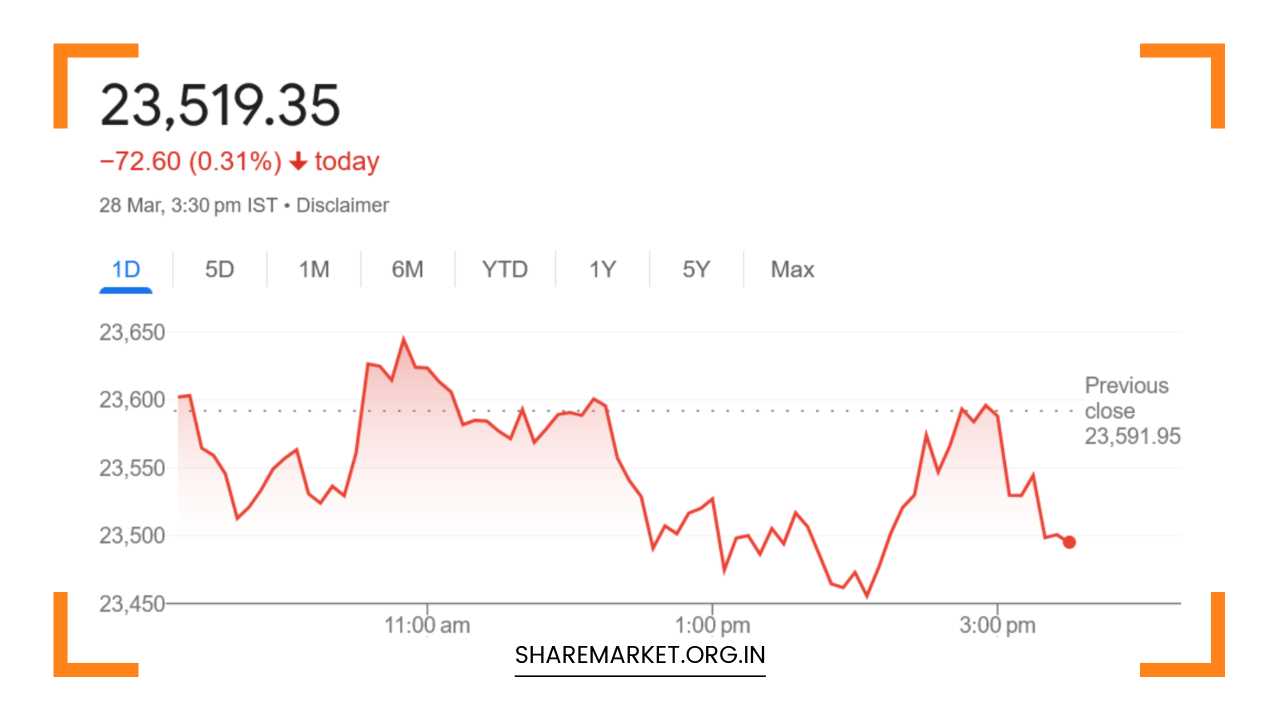Sensex Down 191 Points, Nifty at 23,519; Nifty Prediction for Monday

Nifty Prediction for Monday
Market Overview: Weak Finish to FY25
The Indian stock market closed on a weak note on the final trading day of FY25, driven largely by concerns over the impending implementation of reciprocal tariffs between the U.S. and India.
On the first day of the new trading series for April, March 28, the markets exhibited heightened volatility, as investors reacted to the fear that tariffs between the two nations, set to take effect on April 2, would have a profound impact on various sectors, particularly the auto and IT industries.
These fears overshadowed broader market sentiment, contributing to a notable decline in the benchmark indices.
By the close of trading on Friday, March 28, the Nifty index had fallen 191.51 points, or 0.25%, to settle at 77,414.92.
During the session, the Nifty had witnessed a sharp intraday drop of 420.81 points, reaching a low of 77,185.62 at one point.
Similarly, the Sensex, which tracks the 30 largest and most actively traded stocks on the Bombay Stock Exchange (BSE), closed the day down 72.60 points, or 0.31%, at 23,519.35.
The broader market remained under pressure, with both the Midcap and Smallcap indices ending in the red, falling 0.7% and 0.35%, respectively.
Global Market Sentiment: Impact of U.S. Tariffs
Global cues were weak, and the market opened on a flat note, reflecting broader concerns surrounding the new U.S. tariffs, which are expected to increase costs for many Indian manufacturers, especially in the auto sector.
This caused a ripple effect across a number of sectors, with auto stocks facing the brunt of the selling pressure.
The U.S. is set to impose a 25% tariff on car imports and certain auto parts from India, which has led to concerns about the impact on profitability and future sales of Indian automakers.
Stocks like Maruti Suzuki, M&M, and Tata Motors bore the brunt of these fears, with their share prices falling by significant margins.
The IT sector also faced substantial headwinds, as many Indian IT companies are key exporters to the U.S. and would be adversely affected by higher tariffs or retaliatory actions.
Major IT stocks like Infosys, Wipro, and HCL Technologies saw declines, as investors priced in the potential negative impact of these tariffs on their earnings.
The ripple effect of these concerns extended to other sectors, including realty and media, both of which also posted 1-2% losses during the session.
Despite the overall weakness, certain sectors showed resilience. FMCG stocks, oil and gas companies, and select financials bucked the trend, posting gains in an otherwise gloomy market.
Notable gainers included Tata Consumer, Kotak Mahindra Bank, Hindustan Unilever, Apollo Hospitals, ONGC, ICICI Bank, and Bharti Airtel.
These stocks were seen as defensive plays, offering some shelter from the storm as market participants sought to balance their portfolios in the face of rising uncertainty.
Market Performance in FY25: Positive but Volatile
The broader market sentiment, however, remained cautious, reflecting concerns about both global and domestic economic headwinds.
The U.S.-India tariff issue is likely to remain a significant factor influencing market sentiment in the coming weeks.
With the market closed for the Eid-ul-Fitr holiday on Monday, March 31, traders will return to a market still digesting the potential implications of the new tariffs and its possible spillover effects on Indian exports.
Despite the challenges faced on the final trading day, the Indian stock market had a strong year overall.
Both the Sensex and the Nifty closed the financial year with substantial gains, reflecting resilience amid significant volatility. For FY25, the Sensex surged by 3,763.57 points, or 5.10%, while the Nifty gained 1,192.45 points, or 5.34%.
This positive performance was especially noteworthy given the ups and downs seen throughout the year, including concerns over global trade tensions, inflationary pressures, and domestic economic challenges.
However, the markets managed to overcome these headwinds and close the year on a positive note, driven by strong institutional buying, particularly from domestic institutional investors (DIIs), and an uptick in foreign institutional investor (FII) sentiment toward Indian equities.
Looking specifically at the last week of FY25, the Sensex and Nifty posted modest weekly gains of over 0.5%.
Both indices saw a stronger performance in the month of March, rising by approximately 6%. The rally was fueled by a combination of factors, including positive domestic economic indicators, resilience in key sectors like FMCG, oil and gas, and select financials, and a recovery in global markets from earlier declines.
Sector Performance: Auto and IT Under Pressure
A closer look at the sectoral performance reveals a clear divide between the winners and losers. Barring the FMCG, oil and gas sectors, and select financials, most sectors closed in the red. IT, auto, realty, and media stocks bore the brunt of the selling pressure, with declines of 1-2%.
The auto sector, in particular, faced a tough week, down more than 2%, as concerns about the impact of the U.S. tariffs weighed heavily on investor sentiment.
Among the major losers on the Sensex were Wipro, IndusInd Bank, Shriram Finance, Cipla, HCL Tech, Maruti, Infosys, Zomato, Power Grid, Adani Ports, Tata Consultancy Services, and UltraTech Cement.
On the flip side, stocks like Tata Consumer, Kotak Mahindra Bank, Hindustan Unilever, Apollo Hospitals, ONGC, ICICI Bank, Tata Motors, Nestle, and Bharti Airtel ended the week with solid gains, highlighting the defensive nature of these stocks in times of uncertainty.
Market Prediction for April 1: Navigating Uncertainty
Looking ahead to the first trading day of April, market participants are likely to continue focusing on the fallout from the U.S.-India tariff issue.
The market’s response to these new tariffs will likely remain a key driver of sentiment. Rupak Dey, Senior Technical Analyst at LKP Securities, noted that the Nifty is currently in a consolidation phase, and support around the 23,400 level will be crucial in determining the next directional move.
A decline below this level could trigger a further pullback to 23,200, while a move above 24,200 could signal a continuation of the recent rally.
Srikant Chauhan, Head of Equity Research at Kotak Securities, pointed out that while the market’s performance this week was mixed, foreign investor sentiment remains largely positive, with FIIs having turned net buyers in recent days after months of continuous selling.
The tariff issue is likely to remain a dominant theme for the near term, but other factors, such as RBI policy decisions and Q4FY25 earnings, will also be important in guiding the market’s direction.
In summary, the market faces a precarious situation, with the looming tariff issues set to weigh heavily on investor sentiment.
However, the Indian market has shown resilience in the face of volatility, and with key support levels in focus, investors will need to remain cautious as they navigate the uncertainties of April.

















